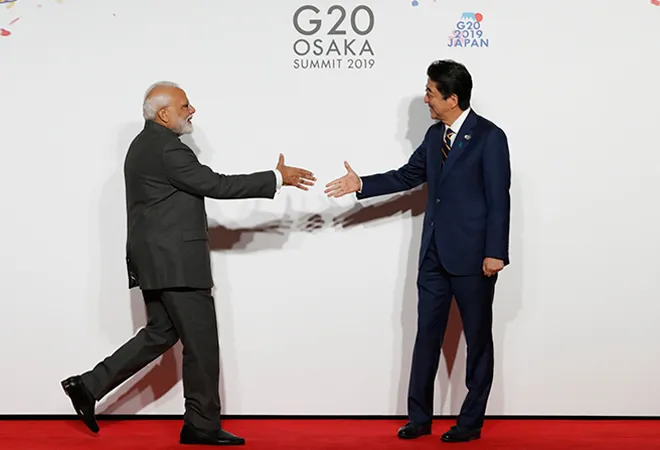
From an analyst’s perspective, one observation has been quite striking, that despite the numerous crisis observed across the world, India has recently followed a vow of silence, refraining from commenting on others’ transgression; a direct contrast to her previous avatar which was comparatively aggressive. In its previous avatar, India was in the throes of globalisation, where its national economy dramatically flourished, and the global community praised the nation’s economic achievements. However, the trend was reversed entirely. Nobody talks about the glorious success of the BRICS countries any more, and the global business community has reversed its previous policy of “outsourcing” to India, by now deciding to strategically relocate business activities back to their home countries. For example, in Japan, almost nobody recommends SMEs to get into the Indian market right now, even though the relevant authorities once energetically persuaded them to “go to India.”
The proposed “sacred alliance” is quite different from the Government of Japan’s previous efforts.
Having said that, it is imperative to highlight that we’re now reaching a period when a “sacred alliance” between Japan and India should be built up as a force of good for the world, politically, economically and socially. Now the question arises, how can a bilateral alliance in the present day be called “sacred”?
From 2008 to 2009, the then Japanese administration led by Prime Minister Taro Aso took a diplomatic initiative called the “
Arc of Freedom and Prosperity” towards the world. The diplomatic thinking, often looked upon as Japan’s ‘grand strategy,’ prioritised the enhancement of both liberalism and capitalism, and tried to persuade other countries to embrace these philosophies. Since it was an open secret that this strategy of Japan’s diplomacy targeted to constrain any kind of further influences from the People’s Republic of China (PRC) to her neighbors, the Aso administration intensively approached to its counterparts in India and asked them to jointly draw the “Arc”. However, the doctrine soon failed and disappeared, mostly due to the short-lived political term of the Aso administration.
However, the proposed “sacred alliance” is quite different from the Government of Japan’s previous efforts. The above-shown “Arc of Freedom and Prosperity” strategy assumed in advance that both liberalism and capitalism shall be protected and enhanced without any limitation. However, what we urgently need is rather to find out ways to limit these two in accordance with the natural development of the environment. In general, Western culture and its civilisation has traditionally followed the ethos that human beings are empowered to change their surrounding circumstances as they see fit. Pursuing insatiable desires shall not be dissuaded, as long as one can pretend that they’re both legal and ethical. Backed by this simple principle since the Renaissance period, liberalism and capitalism have been promoted continuously so far.
In general, Western culture and its civilisation has traditionally followed the ethos that human beings are empowered to change their surrounding circumstances as they see fit. Pursuing insatiable desires shall not be dissuaded, as long as one can pretend that they’re both legal and ethical.
Furthermore, since the PRC has dramatically changed its economic policy to the “
Reform and Open Door Policy” during the late 1970s, the world has entered its most destructive phase yet. China, which traditionally underlined the continuous harmonisation of human activities with the environment, vehemently started gratifying her own desires by consuming huge amounts of the natural resources to develop its economy at an unprecedented pace. The West, particularly the US, has been feeling threatened by this progress, and now, by focusing on the origin of the Covid-19 pandemic, the US has strategically driven China into the corner, with moves such as the “
Hong Kong Autonomy Act” — so as to constrain Beijing’s growing global influence. In response, China has already taken counter measures one after another, and, one may even argue that even a real war between the two superpowers is now seen as a possibility in the future.
The need of the hour is to take appropriate collective action against an outbreak of such a potential conflict, and get back to the ultimate cause of the current turmoil we are facing as a global community. Going forward, we must not be consumed by our individualistic desires but step forward in the firm belief that human beings as a collective are not unquestionable and supreme. It is only through this belief that humanity and all its civilisations will be able to construct cohesive and sustainable answers to political and cultural fundamentals that are being questioned today.
Going forward, we must not be consumed by our individualistic desires but step forward in the firm belief that human beings as a collective are not unquestionable and supreme.
In this regard, a Japan-India alliance is poised to lead the world through these maladies of questions. Since Brahmagupta, a legendary Indian mathematician and author of “Brahmasphutasiddhanta” — succeeded to discover the concept of “zero (0)” — the culture and civilisation of India has respected the concept of ‘emptiness’ — or zero as the origin of the universe far beyond any kind of human activities and capabilities. This traditionally leads the people of India towards the concept of humility towards the environment and nature, which is a sentiment that is shared equally by the people of Japan. To change the wrong belief of human almightiness (originated in the western countries and expanded by the contemporary China) and acquire a new mindset for the next phase of the human civilisation, this kind of “humility” is paramount.
Not any single national interest, but such deep insights into traditions and values can and should unite Japan and India, and this kind of a “sacred alliance” between the two nations is urgently needed to make the rest of the world rethink their way of life, ranging from sustainability to political thought. Beyond seas and borders, the two cultures and civilisations of Japan and India, are thus poised to help divert the world towards a better future.
The views expressed above belong to the author(s). ORF research and analyses now available on Telegram! Click here to access our curated content — blogs, longforms and interviews.



 From an analyst’s perspective, one observation has been quite striking, that despite the numerous crisis observed across the world, India has recently followed a vow of silence, refraining from commenting on others’ transgression; a direct contrast to her previous avatar which was comparatively aggressive. In its previous avatar, India was in the throes of globalisation, where its national economy dramatically flourished, and the global community praised the nation’s economic achievements. However, the trend was reversed entirely. Nobody talks about the glorious success of the BRICS countries any more, and the global business community has reversed its previous policy of “outsourcing” to India, by now deciding to strategically relocate business activities back to their home countries. For example, in Japan, almost nobody recommends SMEs to get into the Indian market right now, even though the relevant authorities once energetically persuaded them to “go to India.”
From an analyst’s perspective, one observation has been quite striking, that despite the numerous crisis observed across the world, India has recently followed a vow of silence, refraining from commenting on others’ transgression; a direct contrast to her previous avatar which was comparatively aggressive. In its previous avatar, India was in the throes of globalisation, where its national economy dramatically flourished, and the global community praised the nation’s economic achievements. However, the trend was reversed entirely. Nobody talks about the glorious success of the BRICS countries any more, and the global business community has reversed its previous policy of “outsourcing” to India, by now deciding to strategically relocate business activities back to their home countries. For example, in Japan, almost nobody recommends SMEs to get into the Indian market right now, even though the relevant authorities once energetically persuaded them to “go to India.”
 PREV
PREV


